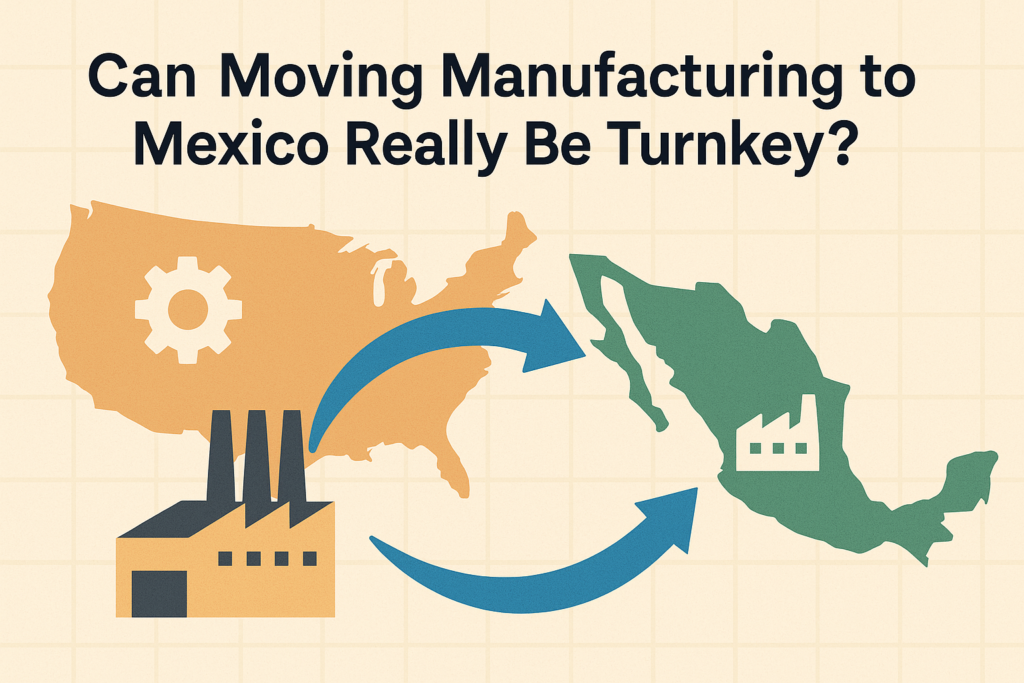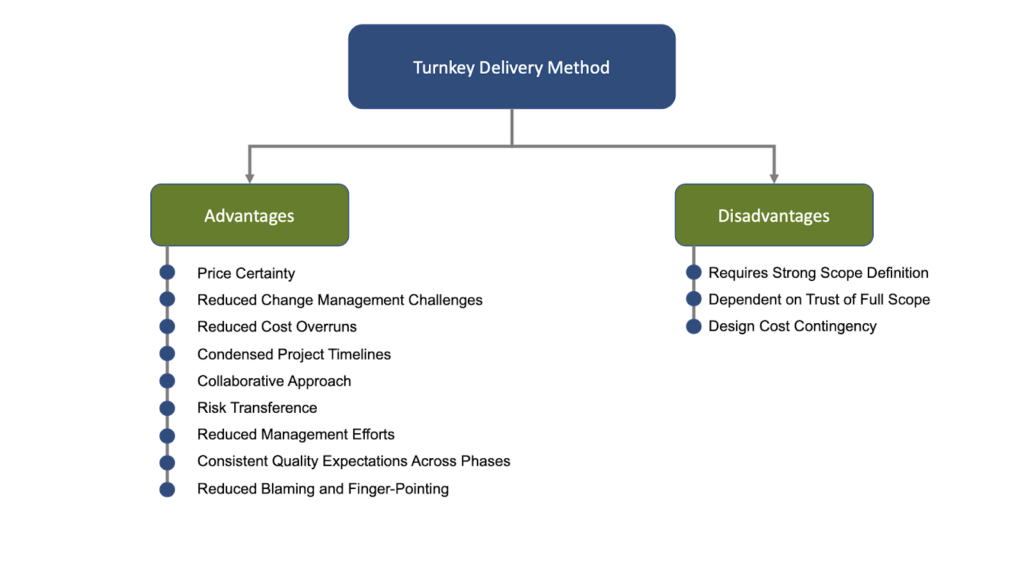Last Updated on July 31, 2025

You’ve heard the phrase “turnkey solution” before. It sounds simple—move your operations to Mexico, and everything’s handled. But is it really that easy? Can moving manufacturing turnkey to Mexico actually live up to the promise, or is it just another buzzword?
Here’s the thing: manufacturing in Mexico can be a lot less complicated than you think, but you need to understand what “turnkey” really means in this context. And honestly, there’s nuance here.
What Does “Turnkey” Actually Mean for Manufacturing?
In manufacturing, “turnkey” usually means that you can walk in, flip the metaphorical switch, and your operation runs smoothly from day one. But let’s be real—it’s never quite that simple. Even the best turnkey solutions require preparation.
In Mexico, though, the shelter model makes the process far less painful. Shelter companies handle the heavy lifting—permits, taxes, labor law compliance, import/export documentation—so you don’t have to. You keep control over production and quality, but you’re spared the administrative headaches.
Think of it like building a house. You could buy the land, hire contractors, deal with the city for inspections, and wait months for utilities. Or, you could buy a fully finished home with the keys already in the lock. That’s the shelter model in a nutshell.
Why Mexico Makes This Model Work
Here’s why Mexico is uniquely positioned for this “plug-and-play” approach:
- Geography – Proximity to the U.S. means faster shipping, easier communication, and frequent site visits.
- Trade agreements – The USMCA gives manufacturers preferential access to the North American market.
- Workforce – Mexico’s skilled labor pool is robust and more affordable than in the U.S. or Canada.
And let’s not forget—Mexico’s time zones align nicely with U.S. operations, which makes collaboration less of a chore.
The Shelter Model Explained (Without the Jargon)
If you’ve never heard of the shelter model, here’s the gist:
A shelter company lets you set up manufacturing in Mexico without forming a Mexican legal entity. They own the permits, handle compliance, and hire the employees. You focus on making your product.
This arrangement dramatically reduces your risk. You’re not locking yourself into expensive real estate or years of navigating foreign bureaucracy. If things don’t work out, you can exit far more easily than if you’d built a factory from scratch.
The Six Types of Mexico Shelter Companies
Are you aware that there are six types of shelter companies, each with advantages and disadvantages?
Contract Manufacturing Shelter
A Contract Manufacturing Shelter is ideal for companies that want to manufacture in Mexico without setting up a legal entity. You'll partner with a local contract manufacturer, who produces your products to your specifications. This type of shelter company is appropriate for businesses that want to test the Mexican market or need temporary manufacturing capacity.
Joint Venture Shelter
A Joint Venture Shelter involves partnering with a local Mexican company to create its own legal entity. This type of shelter company is suitable for businesses that want to share risks and rewards with a local partner. This is done by leveraging their expertise and knowledge of the Mexican market.
Wholly Owned Subsidiary Shelter
A Wholly Owned Subsidiary Shelter allows you to establish a fully owned Mexican subsidiary, giving you complete control over your operations. This type of shelter company is ideal for businesses that want to integrate Mexican operations into their global strategy.
Free Trade Zone Shelter
A Free Trade Zone Shelter operates within a designated free trade zone in Mexico, offering duty-free imports and exports, as well as other tax benefits. This type of shelter company is suitable for businesses that import and export goods regularly.
IMMEX Shelter
An IMMEX shelter is a special program that allows you to temporarily import goods and materials duty-free, as long as they're re-exported or transformed into a final product. This type of shelter company is ideal for businesses that need to import goods for assembly or manufacturing. IMMEX shelters are better suited for companies that wish to manufacture in Mexico long-term and partner with a company like NovaLink.
Service-Based Shelter
A Service-Based shelter provides administrative and operational support, such as human resources, accounting, and logistics, allowing you to focus on your core business activities. This type of shelter company is suitable for businesses that want to outsource non-core functions and streamline their operations.
But Is It Really “Turnkey”?
Yes and no. Shelter services make the process as close to turnkey as it can get. But you still need to plan:
- You’ll choose the location—cities like Monterrey, Tijuana, or Matamoros all offer different advantages.
- You’ll decide which parts of your operation move to Mexico and which stay in-house.
- You’ll work with your shelter partner on production standards, scheduling, and reporting.
So, while you don’t have to deal with endless legal and administrative headaches, you can’t just “set it and forget it.” Your involvement matters.
What Companies Get Wrong About Turnkey Manufacturing
Some businesses assume turnkey means zero effort. That’s a mistake.
You still need to think about:
- Your supply chain – How will materials get to your facility?
- Quality control – Who’s responsible for inspections and audits?
- Scalability – What happens if demand suddenly spikes?
Ignoring these questions can create bigger problems down the road.

Why the Right Partner Changes Everything
Here’s the truth: the success of a turnkey manufacturing setup depends heavily on your partner. Choose the wrong one, and you could find yourself dealing with delays, poor communication, or compliance issues.
Companies like NovaLink, for instance, specialize in acting as a nearshore partner. They have facilities in Matamoros and know the terrain—literally and figuratively. That kind of expertise can make the difference between a smooth launch and a logistical nightmare.
So, Can Moving Manufacturing Turnkey to Mexico Really Work?
It can. But “turnkey” isn’t magic. It’s about using the shelter model and a reliable partner to remove as many obstacles as possible. You’ll still be involved, and you’ll still make decisions, but you won’t be buried in paperwork or struggling through foreign regulations.

If you’re ready to shift production closer to home, the turnkey model in Mexico is one of the simplest, lowest-risk ways to do it. You’ll save time, avoid headaches, and get products to market faster. That’s worth a serious look.
FAQs: Can Moving Manufacturing to Mexico Really Be Turnkey
1. What’s the biggest advantage of using a shelter company in Mexico?
They handle all the regulatory and administrative work, so you can focus on production and quality instead of red tape.
2. Do I have to set up a legal entity in Mexico?
No. That’s one of the biggest benefits. The shelter company operates under its existing legal structure, which speeds up your launch.
3. How long does it take to get up and running?
Many companies can start production in just a few months, depending on the complexity of their products and the availability of space and labor.
4. Can I scale my operations once I’m set up?
Yes, but it’s best to plan for growth with your shelter partner from the start to avoid disruptions.
5. What happens if I decide to leave Mexico?
Exiting is far easier under the shelter model than if you owned your own legal entity or facility. You can end the arrangement with much less risk and cost.
About NovaLink
As a manufacturer in Mexico, NovaLink employs a unique approach that transcends the traditional model of shelter production. More than just the location of your manufacturing, we would like to become a partner in your manufacturing in Mexico. You will be able to relocate or initiate manufacturing for your company in Mexico in a low-cost labor environment with very little delay or up-front costs. Find out how we can help you by handling the manufacturing process.
There are NovaLink facilities in the border cities of Brownsville, Texas, Matamoros, Mexico, and Saltillo, Mexico.